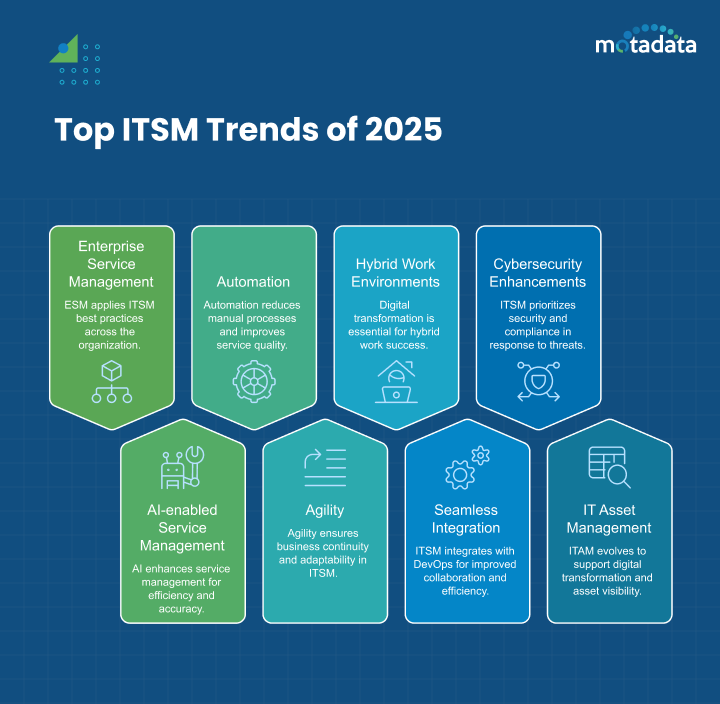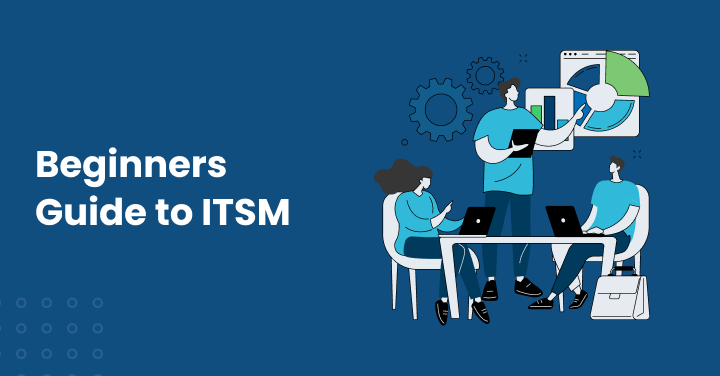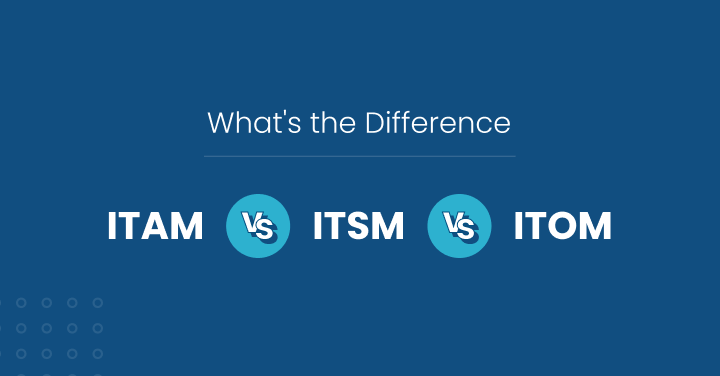Enterprises opted for ITSM technologies in 2025 primarily to achieve business efficiency, enhance productivity, and advance IT operations.
However, as IT teams become more dispersed and remote or, hybrid working becomes a norm, a single platform that efficiently and effectively fulfills users’ requirements has never been more crucial.
In the last two years, the challenge of standing firm in the market, offering more robust and powerful IT solutions to the customer, and technical difficulties have added pressure and possibilities for improvement.
As organizations continue to recover and progress after the pandemic, five major ITSM trends for 2025 will be the focus of IT service desks.
From using artificial intelligence and machine learning technology to streamlining existing processes, let’s look at the five ITSM trends that will undoubtedly play a significant part in the evolution of our workplaces in 2025.
ITSM Trends for 2025
1. Enterprise Service Management (ESM)
After being a popular trend for the last few years, Enterprise Service Management (ESM) will continue being a popular ITSM trend in 2025.
ESM is the system of applying the best practices of ITSM across the organization in various business activities like HR, facilities management, accounting, finance, etc., intending to improve their operations, increase user satisfaction, and service larger business goals.
Organizations can get comprehensive insights into their service operations while gaining broader access to tracking company resources, service obligations, and customer service requests by extending service management principles outside of IT to the whole organization.
By implementing ESM, organizations can reap various benefits, like enhanced productivity, improved visibility and control, reduced wastage, increased user satisfaction, and better ROI.
2. AI-enabled Service Management
According to research, ticket volumes in ITSM have climbed by more than 35% in the last year, owing largely to a rise in remote work.
To manage such an increased workload with limited resources, businesses must adopt tools and technology that decrease the amount of manual labor required for their IT teams. The solution is Artificial intelligence (AI).
So, it is no surprise that Artificial intelligence (AI) is one of the most crucial ITSM trends for 2025 and the overall IT industry.
Artificial Intelligence Service Management (AISM) is the application of artificial intelligence to service management, providing fast, accurate, and scalable services.
AISM is a new strategy that tries to address the growing issues of conventional IT service management by concentrating on proactive prevention, faster service restoration, rapid innovation, and employee and customer experience.
Organizations can use AI for Machine Learning (ML), Natural Language Processing (NLP), business process optimization, automated incident response, and knowledge management.
3. Automation
For years, automation has been one of the top ITSM trends, and this year is no different.
ITSM is intended to make life simpler for users and service providers.
This entails lowering the number of manual processes, relying on automation, and involving IT service desk personnel only when absolutely essential.
Several technologies such as AI, Robotic Process Automation (RPA), and Machine Learning (ML) are involved in automating processes in meaningful ways.
As a result, automation helps organizations improve the quality of their services, enhance productivity, and lower costs.
ITSM exists to supplement, not replace, the human experience.
In 2025, more and more organizations are expected to use automation through machine learning and virtual agents to resolve L1 tickets and support their teams to concentrate on more complex, higher-priority problems.
4. Agility
The last two years have taught us that an organization’s agility is vital to its survival in critical situations.
Agility is vital in ensuring business continuity and disaster recovery.
So, it is essential to have the right technology in place, but it is equally essential to be prepared to keep the organization running if those solutions fail.
ITSM methodology, like contemporary software development, must become agile to keep up with pandemic requirements and people’s expectations in 2025.
To guarantee that service desk teams can adapt to whatever comes next, organizations need to adopt an agile strategy for
ITSM. They start small and develop progressively, iterating to consider what is working and where improvements can be made.
5. Hybrid Work Environments
The COVID-19 pandemic has brought about the need for digital transformation in practically every area of the workforce.
It is no longer an ambitious goal but has become a standard competitive necessity for every organization.
That includes providing consumer-grade experiences not only for customers but also for employees.
In 2025, with most people worldwide still working from home and more permanently, organizations will feel compelled to take their digital transformation to the next level to succeed in a hybrid work environment.
To achieve more efficiency, better productivity, and reduce operating costs in a distributed work environment, ITSM processes and tools and their integration with other technologies will play a critical role.
6. Seamless Integration with DevOps Practices
In 2025, IT Service Management (ITSM) is evolving to integrate seamlessly with DevOps, fostering a culture of agility, automation, and continuous delivery.
Organizations are breaking down silos between development and IT operations, ensuring faster incident resolution, streamlined workflows, and improved collaboration.
AI-driven ITSM tools are enabling predictive issue resolution and automated change management, reducing downtime and enhancing service reliability.
This integration supports rapid software deployments without compromising stability, aligning ITSM with business objectives.
As DevOps adoption grows, ITSM frameworks are adapting to facilitate service orchestration, monitoring, and governance, making IT operations more efficient and resilient.
7. Cybersecurity and Compliance Enhancements
With the rise in cyber threats and stringent regulations, IT leaders emphasize that ITSM in 2025 is prioritizing security and compliance. AI-powered security monitoring, automated compliance reporting, and real-time threat detection are now integral to ITSM platforms.
Zero Trust security models are embedded within service management processes to protect sensitive data.
Enhanced identity and access management (IAM) solutions are preventing unauthorized access, ensuring secure service delivery. ITSM is no longer just about efficiency—it’s a critical pillar of an organization’s cybersecurity posture.
8. Expansion of IT Asset Management Capabilities
IT Asset Management (ITAM) is expanding beyond traditional inventory tracking to become a strategic enabler of digital transformation.
In 2025, organizations are leveraging AI and IoT to achieve real-time visibility into IT assets across cloud, on-premises, and hybrid environments. Automated asset lifecycle management, predictive maintenance, and cost optimization are key trends.
Enhanced ITAM capabilities help businesses mitigate risks, improve governance, and maximize ROI on IT investments. The convergence of ITSM and ITAM ensures seamless service delivery, compliance adherence, and better decision-making.
With sustainability in focus, organizations are also optimizing asset utilization to reduce e-waste and carbon footprint.
Conclusion
All organizations aim to have efficient and scalable IT service management processes.
These trends for 2025 demonstrate that ITSM is more vital than ever.
Motadata’s ITSM platform, ServiceOps, can help you stay ahead of these service management trends with in-built automation, AI-enabled ticket management, virtual agent, and enterprise service management capabilities to streamline your service delivery across a distributed workforce.
Download our 30 days free trial to see how Motadata ServiceOps can help you make 2025 the year of your digital transformation!
FAQs:
IT Service Management (ITSM) ensures efficient delivery of IT services, which remains vital as organizations adapt to evolving technology and operational models.
AI improves ticket resolution through automation, predictive analysis, and chatbots, streamlining operations.








